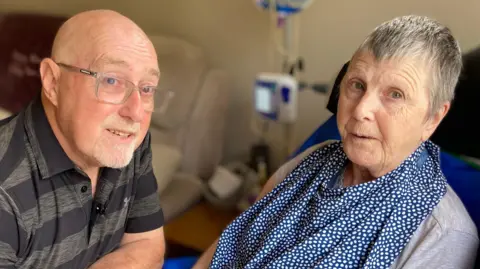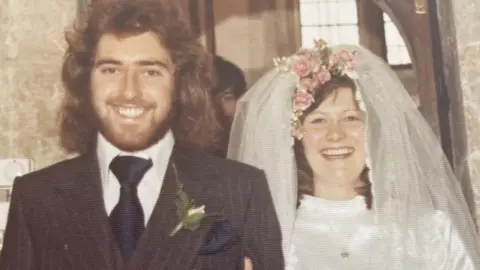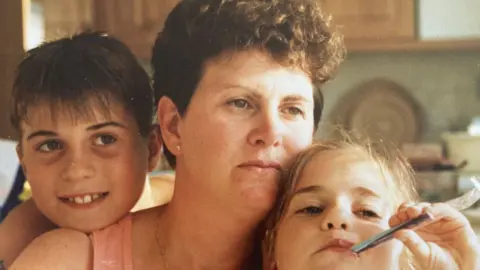'Love keeps me going' - Huntington's carer
 BBC
BBC"I sleep very lightly, almost with one ear and one eye open," says Steve Duckett who cares for his wife, Sandy, who has Huntington's disease.
"I have learned to be a good carer but it is relentless," he continues.
Mrs Duckett, 72, first developed symptoms about 25 years ago.
The inherited genetic condition, which her mother died of, leads to the progressive deterioration of behaviour, thinking and movement. There is currently no cure.
Mr Duckett retired early -10 years ago - from his job in local government, to become a full-time carer.
"At that stage it was more to give Sandy companionship, to make sure she remembered to eat and to help her with everyday tasks," he says.

'You never really switch off'
Mrs Duckett's condition has since deteriorated and her very complex health needs means she now qualifies for NHS continuing healthcare, which funds daily carers in their home.
Mr Duckett describes the carers who look after his wife as "diamonds" and says their expert help has made a "huge difference".
"They have given me my life back," he says, but admits he still cares for his wife for about 100 hours a week.
"I do all the night time care," he explains.
"I bear the responsibility of looking after her. You never really switch off. I am the one that knows her really well, watches the signs.
"I try to make sure she is getting all the help she needs."
Mrs Duckett has lost all of her mobility, needs to be hoisted and is mostly fed through a feeding tube because her ability to swallow has become severely compromised.
But her attitude to the illness is "inspirational", her husband says.
"I have never heard her say, 'Why me?', she still maintains that stoic, positive approach to it," says Mr Duckett, adding: "She is remarkable."
The couple, who live in Corfe Mullen in Dorset, married in 1973.
Mr Duckett says they are "incredibly fortunate" that both of their children tested negative for Huntington's.
Children have a 50% chance of inheriting the disease from an affected parent.

'Carers deserve recognition'
Mrs Duckett is only able to speak occasional words.
"She still tells me she loves me and that makes me a bit tearful," Mr Duckett says.
"My love for Sandy keeps me going."
He reflects on how illness has altered their relationship.
"That change from husband to carer is subtle," he says.
"I have lost a lot, that explains why sometimes I feel a little bit sad."
He is keen to raise awareness of Huntington's Disease and the role carers play.
"We have always been that couple who will say, 'Sandy has Huntington's, what do you want to know?'," he says.
The Huntington's Disease Association says there is a need for more awareness of the condition, including among some healthcare professionals.
Mr Duckett supports other carers in Dorset through voluntary work.
"Caring is a difficult, tough gig, it does become a bit of a burden," he says.
"You get used to coming second. I say to people, 'you need to look after yourself'."
Carers UK says unpaid carers save the UK an estimated £184bn a year.
But Mr Duckett says too often carer's stories are unheard.
"We are really valuable,which is why I think it's important that carers get the recognition and are respected."
'Selfless dedication'
A government spokesperson says it recognises "the immense contribution of carers who selflessly dedicate their time to supporting others".
"To ensure families get the support they need, we have increased the carer's allowance earnings limit by around an extra £2,000 a year – the biggest rise since it was introduced in 1976," they add.
"The Better Care Fund, backed by £9bn, includes funding that can be used to provide carers with short breaks and respite services.
"Baroness Casey's independent commission into adult social care, which started in April, will explore the needs of unpaid carers who provide vital care and support."
You can follow BBC Dorset on Facebook, X (Twitter), or Instagram.
